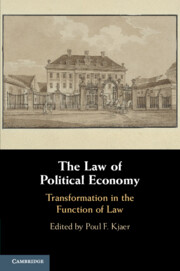Book contents
- The Law of Political Economy
- The Law of Political Economy
- Copyright page
- Dedication
- Contents
- Contributors
- Acknowledgements
- Abbreviations
- 1 The Law of Political Economy
- Part I Studying the Law of Political Economy
- Part II Transformations of the Law of the Globalising Economy
- Part III The Transformation of the Law of Political Economy in Europe
- Part IV Towards a New Law of Political Economy
- 12 The Future of Law – ‘Serial Law’?
- 13 After Governance?
- 14 The Transnational Dimension of Constitutional Rights
- 15 Counter-Rights
- Index
12 - The Future of Law – ‘Serial Law’?
from Part IV - Towards a New Law of Political Economy
Published online by Cambridge University Press: 18 April 2020
- The Law of Political Economy
- The Law of Political Economy
- Copyright page
- Dedication
- Contents
- Contributors
- Acknowledgements
- Abbreviations
- 1 The Law of Political Economy
- Part I Studying the Law of Political Economy
- Part II Transformations of the Law of the Globalising Economy
- Part III The Transformation of the Law of Political Economy in Europe
- Part IV Towards a New Law of Political Economy
- 12 The Future of Law – ‘Serial Law’?
- 13 After Governance?
- 14 The Transnational Dimension of Constitutional Rights
- 15 Counter-Rights
- Index
Summary
The legal system undergoes again a deep process of transformation that may be attributed to the emergence of the “society of networks”. The earlier transformations that took place in the “society of organisations” were centred around the organisation as a kind of “big individual” that was and still is able to aggregate and manage long chains of actions as opposed to the individual subject whose action was rule oriented and followed established patterns of experience. The “society of organisations” was characterised by the rise of all kinds of social norms (standards), organised generation of knowledge, and practices of “balancing” that the multiplication of long chains of action have made necessary. The “society of networks” leads to more complex processes of knowledge generation and tends to create new “quasi-subjects” that follow mobile project-like patterns of co-operation. They are focused on “high knowledge” that is involved in permanent processes of self-transformation. The emergence of “data driven technologies” that do not follow stable trajectories is paradigmatic. It is a challenge for the legal system if what the new loosely aggregated quasi-subjects of the “society of networks” do is “surfing fluid reality” (Bahrami and Evans). This evolution finds its repercussion in new challenges for the regulatory state and also for contracting practices in private law. “Serial law” might be a new paradigm of law that “reads” processes of change in real time and experiments with forms of co-ordination that refer to learning processes.
- Type
- Chapter
- Information
- The Law of Political EconomyTransformation in the Function of Law, pp. 299 - 319Publisher: Cambridge University PressPrint publication year: 2020

